
 Postmaster General Patrick Donahoe’s plan to end Saturday mail delivery beginning August 5 is a “disastrous idea that would have a profoundly negative effect on the U.S. Postal Service (USPS) and on millions of customers,” says Letter Carriers (NALC) President Fredric Rolando.
Postmaster General Patrick Donahoe’s plan to end Saturday mail delivery beginning August 5 is a “disastrous idea that would have a profoundly negative effect on the U.S. Postal Service (USPS) and on millions of customers,” says Letter Carriers (NALC) President Fredric Rolando.
Postal Workers (APWU) President Cliff Guffey says:
USPS executives cannot save the Postal Service by tearing it apart. These across-the-board cutbacks will weaken the nation’s mail system and put it on a path to privatization.
He adds that the USPS already has begun slashing mail service by closing 13,000 post offices or drastically reducing hours of operation, shutting hundreds of mail processing facilities and downgrading standards for mail delivery to America’s homes and businesses.
Rolando calls Donahoe’s strategy in dealing with the Postal Service’s financial challenges a “slash-and-shrink approach.”
Postal unions have tried to work with USPS management to develop costs savings and growth measures.

As I embark on a new chapter in my life as President and CEO of the Southern Christian Leadership Conference of Southern California, I’d like to reflect here upon some of the lessons I have learned while working at the Los Angeles Alliance for a New Economy for nearly 10 years. If we are going to help workers overcome the oppression they face on their jobs, and if we are going to work with communities to help them to become healthy and viable, then we have to have a dynamic plan and strategy that will lead to victory. Simply put in LAANE language, we must have a “strategy to win.”
For nearly 20 years LAANE has utilized this strategy to win to gain victories that have improved the lives of 350,000 people nationwide. It has engaged labor partners, environmental and community groups, and faith-based organizations, to score victories in and around Los Angeles.
» Read more about: The Calculus of Organizing: A Strategy To Win »
When I moved to East Hollywood a number of years ago, I asked a friend who lived next door if it was a quiet neighborhood. “No,” she said, “there’s a different trash truck every morning, sometimes more than one, sometimes at 6 a.m. If it weren’t for that, it would be quiet.”
Unfortunately, she was right. We would get stuck behind trucks on our way to work as they blocked our narrow neighborhood street. Our block was lucky enough to get repaved roads — but they were immediately destroyed by the heavy trash trucks, which carved deep ruts into the new finish and leaked trash juice into the setting asphalt.
A few years later, I started working in the Northeast San Fernando Valley, a low-income community of color where many of the city’s industries and pollution sources are concentrated. In Pacoima, I observed how the 10 or so trash trucks we’d seen each week in East Hollywood,
» Read more about: How L.A.’s Waste System Trashes Our Streets & Our Health »


 (Editor’s Note: Today we continue our series of posts from invited writers who offer thoughts on what the coming four years hold for Los Angeles and its next mayor. These opinions do not reflect the views of Frying Pan News or the Los Angeles Alliance for a New Economy.)
(Editor’s Note: Today we continue our series of posts from invited writers who offer thoughts on what the coming four years hold for Los Angeles and its next mayor. These opinions do not reflect the views of Frying Pan News or the Los Angeles Alliance for a New Economy.)
Before Antonio Villaraigosa won his first term as mayor, he came over to my house to film a commercial. This took place by the merest chance. My neighbor across the street is a union organizer, a fellow progressive and a respected figure in local Democratic circles — he might have had something to do with Villaraigosa’s sudden appearance in our neighborhood. A whole bunch of staffers fanned out up and down our street that morning, knocking on every door to ascertain where they might mingle with hoi polloi and gather up a few sound bites.
» Read more about: Memo to Next Mayor: We’re All in This Together »


 The walking, talking, governing refutation of the notion that there are no second acts in American lives is on a roll in California. “I’ve never been more excited,” Gov. Jerry Brown says, “and this is my 11th year on the job.”
The walking, talking, governing refutation of the notion that there are no second acts in American lives is on a roll in California. “I’ve never been more excited,” Gov. Jerry Brown says, “and this is my 11th year on the job.”
Brown, 74, has ample reason for excitement. After a calamitous recession (inland California was the epicenter of the subprime quake) and nearly a decade of record deficits and legislative gridlock, Brown has come up with a budget that will put the Golden State into surplus territory without requiring further cuts. In November, voters approved Brown’s ballot measure, Proposition 30, which raised taxes on the wealthy and stabilized state finances to the point that Standard & Poor’s upgraded California’s credit rating last week. The new revenue has gone chiefly to schools and universities, though Brown wants to change K-12 funding so that money flows disproportionately to those districts with more impoverished and Spanish-speaking children.


In February 2005, Patti Phillips sat by her daughter’s bedside during the weeks before Stephanie Phillips died of bone cancer. Patti was able to be at her daughter’s side the day she died because of the federal law that allows millions of Americans to take family leave without risking their jobs. “You want to be there with your child…. and you don’t want to worry about your job,” said Phillips, 49, an inventory specialist at Coca-Cola in Atlanta. “The law gives you peace of mind.”
This week will mark 20 years since the Family and Medical Leave Act (FMLA) was signed into law by the newly inaugurated President Bill Clinton on February 5, 1993, after years of bitter opposition by the Chamber of Commerce and other business lobbies. Clinton said that it was time for employers to make basic commitments to American workers so that during those critical times when we must put our family’s health first,
» Read more about: The Family and Medical Leave Act and Its Enemies »


For years, women who clean rooms at Hyatt hotels have been speaking out against the injuries and hazards they face at work. In a recent press statement, Hyatt denied there is a problem, reducing citations and settlements to mere technicalities. Despite their protests, California state regulators disagree.
In a bold move last week, state regulators fired back at statements made by a Hyatt spokesperson that problems housekeepers face at the Hyatt Fisherman’s Wharf Hotel were “the equivalent of lagging paperwork.”
According to Amy Martin, the chief counsel of Cal/OSHA who called the San Francisco Bay Guardian disputing claims made by a Hyatt spokesperson:
“Cal/OSHA believes it found plenty of evidence both of injuries sustained by housekeepers, as well as violations of Cal/OSHA regulations.”
Comments traded by Hyatt and government officials last week came after a major settlement in a longstanding case [revolving] around housekeeper injuries at the Hyatt Fisherman’s Wharf Hotel.
» Read more about: Frisco Hyatt: “WHAT Injury-Wracked Housekeepers?” »


 (Editor’s Note: Living in Los Angeles is a day-to-day experiment requiring patience and improvisational skills. So does governing this sprawling metropolis of 3.8 million people. The city’s next mayor, however, cannot be satisfied with merely coping with issues as they arise, but must be able to look forward and anticipate and define the city’s needs for the next four years. To this end we’ve asked writers to share their thoughts about what lies ahead – and around the corner – for Los Angeles.)
(Editor’s Note: Living in Los Angeles is a day-to-day experiment requiring patience and improvisational skills. So does governing this sprawling metropolis of 3.8 million people. The city’s next mayor, however, cannot be satisfied with merely coping with issues as they arise, but must be able to look forward and anticipate and define the city’s needs for the next four years. To this end we’ve asked writers to share their thoughts about what lies ahead – and around the corner – for Los Angeles.)
Going green may be all the rage. But get into the weeds and you may lose a few people. Take energy efficiency. Yes, it’ll save you money, create good jobs (if done right) and help us preserve the planet. But walk into a party and start talking about window caulking, attic insulation and compact fluorescent bulbs, and you may soon find yourself alone in a corner.
» Read more about: Beyond the Election: How Green Will Our City Be? »


 Most of us have been on both sides of it — receiving a coffee or sandwich from an employee who seems just a little too happy to serve you, or being forced to beam a smile at a rude customer who views you as merely an annoying obstacle in his busy day. The term for this coerced sunniness is “emotional labor,” as first defined by sociologist Arlie Russell Hochschild in 1983.
Most of us have been on both sides of it — receiving a coffee or sandwich from an employee who seems just a little too happy to serve you, or being forced to beam a smile at a rude customer who views you as merely an annoying obstacle in his busy day. The term for this coerced sunniness is “emotional labor,” as first defined by sociologist Arlie Russell Hochschild in 1983.
Hochschild coined the term “emotional labor” in her 1983 book, The Managed Heart: Commercialization of Human Feeling, where she described it as ”management of feeling to create a publicly observable facial and bodily display … sold for a wage.”
Midwives, psychologists and funeral home directors are expected to calm the seas of their clients’ moods, and affluent visitors of high-end boutiques and restaurants pay a healthy premium to be coddled by their employees — but should workers making little more than minimum wage be forced to smile or be fired?

 Exactly a century ago, on February 3, 1913, the 16th Amendment to the Constitution was ratified, authorizing a federal income tax. Congress turned it into a graduated tax, based on “capacity to pay.”
Exactly a century ago, on February 3, 1913, the 16th Amendment to the Constitution was ratified, authorizing a federal income tax. Congress turned it into a graduated tax, based on “capacity to pay.”
It was among the signal victories of the progressive movement — the first constitutional amendment in 40 years (the first 10 had been included in the Bill of Rights, the 11th and 12th in 1789 and 1804, and three others in consequence of the Civil War), reflecting a great political transformation in America.
The 1880s and 1890s had been the Gilded Age, the time of robber barons, when a small number controlled almost all the nation’s wealth as well as our democracy, when poverty had risen to record levels, and when it looked as though the country was destined to become a moneyed aristocracy.
But almost without warning, progressives reversed the tide. Teddy Roosevelt became president in 1901,
» Read more about: A Progressive Anniversary: The Income Tax Is 100 Years Old »


My (early) New Year’s resolution was to get a credit card. You may remember that I have never had a credit card. And thus if I were on the dating market, my OKCupid inquiries would be flatly rejected. It’s not that I have a bad score. I just don’t have one. I had a good score when I was dutifully paying off my student loan after I graduated, but then through paying dirt-cheap rent in Harlem and never paying for cable I was able to pay off the loan. Since then I haven’t owned any credit products. I’ve paid my rent on time every month and paid every bill before the due date. But those things don’t make their way over to FICO. I’ve thus landed myself in quite the Catch-22 that speaks volumes about the lending industry and our reliance on it.
When I moved into a new apartment three years ago,
» Read more about: Give Her Credit: A Writer’s Pursuit of Plastic Debt »


When the President finished his inaugural speech the other week, I said to my wife Susan, “That was a great piece of rhetoric.” By that I did not mean a lot of flowery words strung together or a piece of political discourse from a particular party’s perspective. I meant it as high praise of a public address that transcends the immediate moment and inspires us as a people to live up to our nation’s principles. This one, unlike four years ago, felt like the caliber of speeches I had studied in college in a course on Rhetoric and Public Address.
At least that is what I thought I’d heard. The President talked about the unresolved problems that face us as a nation: immigration, gun reform, deficit control, climate change, economic inequality. He placed those within the context of this nation’s founding principles: life, liberty, the pursuit of happiness. Then the President reminded us how we Americans have always acted to resolve the issues that face us: from Seneca Falls to Selma to Stonewall – three locations that struck movements to expand democracy and make the pursuit of happiness more possible for more people.
» Read more about: Walking the Talk: A Speech for All Seasons »


 In 2012, Indiana and Michigan joined the ranks of the “right to work” states. They joined 22 other mostly Southern and Western states. All 11 Southern states are “right to work.”
In 2012, Indiana and Michigan joined the ranks of the “right to work” states. They joined 22 other mostly Southern and Western states. All 11 Southern states are “right to work.”
Unfortunately, living in a “right to work” state doesn’t mean that you have a right to work. It doesn’t even mean that you have a right not to join a union. No one ever has to join a union.
It means that you don’t have to pay for union representation in collective bargaining even when the majority of the workers in their company have democratically voted to be represented by the union.
The union still bargains for you. It helps you get a good salary, paid holidays and a health plan. Members of the union sometimes even go out on strike to make sure you get these benefits.
But when it’s time to pay the piper,
» Read more about: Right to Work Laws: Opening Pandora’s Box »


I wonder what the three mayoral candidates thought of last night, as they traveled to the third and final debate to be held in South Los Angeles before the March 5 election. Were Wendy Greuel, Jan Perry and Eric Garcetti affected by the change in scenery as they drove closer to Ward AME Church, one of the city’s historic religious institutions?
I would like to think that they clearly saw the run-down corridors, littered with liquor stores, abandoned buildings, empty lots and fast food joints. As they approached the steps of the church did these veteran public servants allow themselves to catch the eyes of that beautiful little neighborhood girl or boy who has access to fewer resources, as well as a lower probability of living a high quality life than a child from the Westside or San Fernando Valley?
Looking forward, if elected, would the high poverty rates in South Los Angeles and elsewhere keep Greuel,
» Read more about: Mayoral Candidates Forum: Debating South L.A.’s Future »

 The accolades for Timothy Geithner came on so thick and heavy in the last week that it’s necessary for those of us in the reality-based community to bring the discussion back to earth. The basic facts of the matter are very straightforward. Timothy Geithner and the bailout he helped engineer saved the Wall Street banks. He did not save the economy.
The accolades for Timothy Geithner came on so thick and heavy in the last week that it’s necessary for those of us in the reality-based community to bring the discussion back to earth. The basic facts of the matter are very straightforward. Timothy Geithner and the bailout he helped engineer saved the Wall Street banks. He did not save the economy.
We can’t know exactly what would have happened if we did not have the TARP in October of 2008. We do know there was a major effort at the time to exaggerate the dangers to the financial system in order to pressure Congress to pass the TARP.
For example, Federal Reserve Board Chairman Ben Bernanke highlighted the claim that the commercial paper market was shutting down. Since most major companies finance their ongoing operations by issuing commercial paper, this raised the threat of a full-fledged economic collapse because even healthy companies would not be able to get the cash needed to pay their bills.


 Atop the list of landmark laws that conservatives have never particularly warmed to are two that established fundamental rights for workers and consumers: the 1935 National Labor Relations Act, which provided employees a legal path to form unions, and the 2010 Dodd-Frank financial reform, which established a Consumer Financial Protection Bureau to rein in banks’ abusive treatment of depositors and mortgage holders. Conservatives have never had the votes or the gumption to repeal these statutes. But now they can essentially neuter these laws.
Atop the list of landmark laws that conservatives have never particularly warmed to are two that established fundamental rights for workers and consumers: the 1935 National Labor Relations Act, which provided employees a legal path to form unions, and the 2010 Dodd-Frank financial reform, which established a Consumer Financial Protection Bureau to rein in banks’ abusive treatment of depositors and mortgage holders. Conservatives have never had the votes or the gumption to repeal these statutes. But now they can essentially neuter these laws.
[Last] Friday, three judges on the U.S. Court of Appeals for the District of Columbia Circuit — all nominated by Republican presidents — ruled that President Obama lacked the authority for three appointments he had made to the National Labor Relations Board (NLRB) during the break between Congress’s 2011 and 2012 sessions. Invoking the president’s power to make one- or two-year appointments while Congress is in recess — a power that presidents have exercised as far back as James Madison — Obama appointed two Democrats and one Republican in the face of continued Republican opposition to his previous NLRB picks.
» Read more about: Court Decision Could Cripple NLRB and Consumer Bureau »

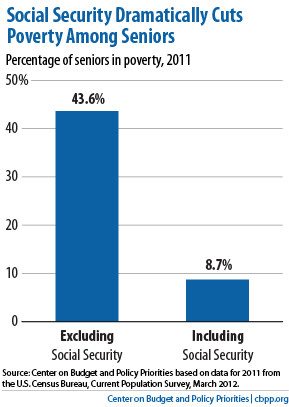 As Senator Bernie Sanders has warned, “Social Security faces an unprecedented attack from Wall Street, the Republican Party and a few Democrats. If the American people are not prepared to fight back, the dismantling of Social Security could begin in the very near future.”
As Senator Bernie Sanders has warned, “Social Security faces an unprecedented attack from Wall Street, the Republican Party and a few Democrats. If the American people are not prepared to fight back, the dismantling of Social Security could begin in the very near future.”
What exactly does the 99 Percent need to know to defend Social Security against the Wall Street One Percenters who want to profit by destroying it?
First, know our adversaries. Listen closely to the corporate-funded Heritage Foundation, headed by Tea Party hero and former Senator Jim DeMint. They want to turn part of our retirement and disability savings over to the same Wall Street firms that crashed our economy.
Heritage’s Social Security plan would
» Read more about: Wall Street’s Newest Hedge Fund: Social Security »
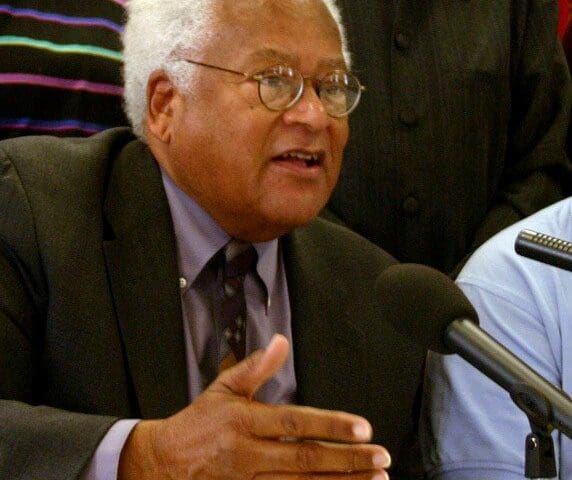
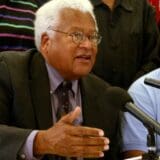
Civil rights leader Reverend James Lawson announced last Saturday that he’s planning to give himself to a new nonviolent direct action campaign with the Children’s Defense Fund, but wasn’t ready yet to discuss the details. The setting was his monthly workshop on the theory of nonviolence, where upwards of 35 people of diverse ages and backgrounds were gathered to hear Lawson present his provocative thoughts on basic human values, spirituality and the need for systemic social change.
Credited with introducing nonviolent direct action to the 1960s civil rights movement, Rev. Lawson feels the theory of nonviolence has had the equivalent impact on our understanding of the universe as Einstein’s theory of relativity. He sees the recent growth of California’s labor movement as an outgrowth of what Lawson calls “this science of social change” introduced to the state by farm worker leader Cesar Chavez in the 1960s and 70s.
Lawson was dressed last weekend in pressed khaki slacks,
» Read more about: James Lawson: Training for Nonviolence’s Next Step »


 The Conference Board reported Tuesday that the preliminary January figure for consumer confidence in the United States fell to its lowest level in more than a year.
The Conference Board reported Tuesday that the preliminary January figure for consumer confidence in the United States fell to its lowest level in more than a year.
The last time consumers were this bummed out was October 2011, when there was widespread talk of a double-dip recession.
But this time business news is buoyant. The stock market is bullish. The housing market seems to have rebounded a bit.
So why are consumers so glum?
Because they’re deeply worried about their jobs and their incomes – as they have every right to be.
The job situation is still lousy. We’ll know more this coming Friday about what happened to jobs in January. But we know over 20 million people are still unemployed or underemployed.
Personal income is in terrible shape. The median wage continues to drop, adjusted for inflation.


 The Republican Party spent the better part of the past few years reaching back a century or more for ideas. Where liberals saw the dangers of a creeping Gilded Age on the horizon, conservatives cheered the true freedom that attends gross economic inequality. Paul Ryan, one of the GOP’s standard-bearers, repeatedly excited crowds with the promise of the true adventure and excitement that comes from riding the free market without a social safety net. By adopting the Republican vision, he explained, you choose against “a dull, adventureless journey from one entitlement to the next, a government-planned life, a country where everything is free but us.”
The Republican Party spent the better part of the past few years reaching back a century or more for ideas. Where liberals saw the dangers of a creeping Gilded Age on the horizon, conservatives cheered the true freedom that attends gross economic inequality. Paul Ryan, one of the GOP’s standard-bearers, repeatedly excited crowds with the promise of the true adventure and excitement that comes from riding the free market without a social safety net. By adopting the Republican vision, he explained, you choose against “a dull, adventureless journey from one entitlement to the next, a government-planned life, a country where everything is free but us.”
Similarly, there is currently a conservative attempt to rehabilitate the infamous 1905 Supreme Court decision of Lochner v. New York, which struck down on economic liberty grounds a New York state law that forbade bakers from working more than 10 hours per day and 60 hours per week.
» Read more about: Atlas Smirked: Why the GOP Kicks the Ladders to Prosperity »